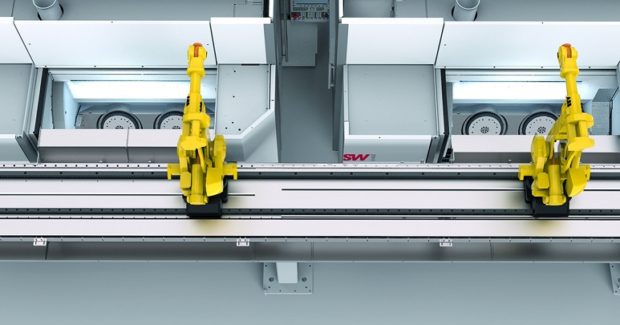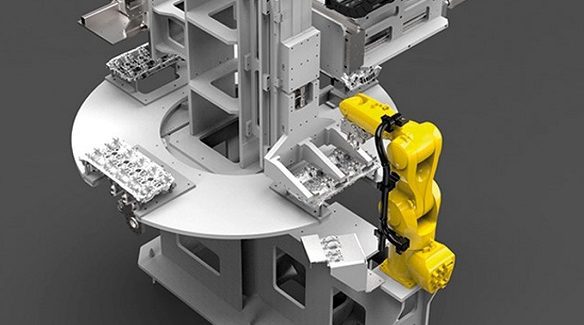Integrated Robotic Automation of Machine Tools and Assembly
For machine shops that need multi-spindle, high precision machining centers, SW North America can also integrate automated robot cells, assembly systems and turnkey production systems for increased productivity.
Posted: February 3, 2019
Machine shops that are examining the benefits of multi-spindle, high precision machining centers from SW North America, Inc. (New Hudson, MI) will find even further advantages in their full range of automated robot cells, assembly systems and turnkey production systems. “Having the machine tool builder provide automation systems provides significant benefits compared to third-party approaches,” explained Sven Makis, the managing director of SW Automation. “We take on complete responsibility, including all layout planning, project design, and interface coordination through structured project management, technical expertise, and experienced and longstanding, reliable partners. Feasibility checks and layout definition are delivered in advance with the aid of cycle-time design and material flow analysis in a simulation model. Parts and processes can be traced using intelligent database solutions through suitable software and technical competence. Even perfect coordination of machining center, tool and gripper concept happens through know-how, experience, and close collaboration and coordination of individual components.”
For example, overhead-mounted seven-axis robots supply a high level of flexibility and safety for machine tool loading and unloading at a low space requirement. Overhead mounting means the machining center is freely accessible, with no protective fences. Partial automation using modular systems can be engineered for maintenance or manual loading, if desired, and easily expanded for increased volumes. Another example are assembly robots for inserting sleeves into a bearing cover, automatic workpiece loading, pre-assembly of individual sleeves into the bearing cover, joining the sleeves while simultaneously monitoring force and distance, robotic transfer of bearing covers for the next process, or other functions. Additional automation modules include peripheral functions such as brushing and component deburring with a deburring spindle; pressure and tightness testing and calibration; dimensional measurement and calibration; parts cleaning; and palletizing/packaging, all connected by transport systems, including accumulating conveyors, timing chains, pallet storage systems and lifting and lowering units. Use of RFID systems, cameras, and databases can also be accommodated.
In one example involving assembling transmission and clutch housings, 48 machining centers were networked with deburring, assembly, parts washing, and pressure-testing modules to achieve a cycle time of 45 seconds per part inside a space-saving layout with walk-through access for operators and maintenance personnel and a high degree of flexibility in arranging machining functions and workpiece handling. In another example involving cylinder head covers, necessary tasks included sleeve assembly, bearing cover assembly, and plain text labeling, all with force/distance monitoring during assembly. With a volume of 340,000 units per year, this system achieved a line cycle time of 26 seconds while maintaining specified quality metrics.
SW North America, Inc., 30160 Lyon Industrial Court, New Hudson, MI 48165, 734-736-4027, contact.na@sw-machines.com, www.sw-machines.de/us.





